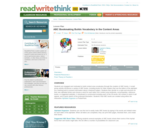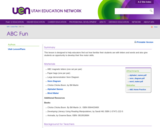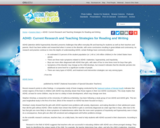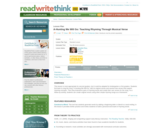
AAA Math provides a descriptive summary of the division of integers and interactive questions with positive and negative integers.
- Subject:
- Mathematics
- Material Type:
- Lesson Plan
- Provider:
- AAA Math
- Date Added:
- 12/01/2023

AAA Math provides a descriptive summary of the division of integers and interactive questions with positive and negative integers.

This lesson contains a learning exercise in which the user has to find the greatest common factor and type it in. The exercise keeps track of how many right and wrong answers given and gives you a grade.

V is for vocabulary. A content area unit provides the theme for a specialized ABC book, as students select, research, define, and illustrate a word for each alphabet letter.

Six 50-minute lessons build vocabulary through the content areas by making an ABC book. It can become a classroom resource. Links include a non-fiction book list, checklist, word list, rubric, and a storyboard chart. There is also a link to alphabet organizer.

This lesson is designed to help educators find out how familiar their students are with letters and words and also give students an opportunity to develop their fine motor skills.

This article provides an overview of current research about attention deficit hyperactivity disorder as well as strategies to help students with ADHD with reading and writing.

Contains plans for two lessons that teach about rhyming words using the song "A-Hunting We Will Go." In addition to objectives and standards, this instructional plan contains links to sites used in the lessons as well as assessment and reflection activities.

Adapting the song "A-Hunting We Will Go," students put a "whale" in a "pail" and even "take a little "bear" and hug it if we "dare"."

In this lesson, students will learn how to make sense of conflicting viewpoints from credible sources. They will first read two articles on the same topic (ocean plastic), but with differing viewpoints on the severity of the problem. Then, using a Venn Diagram created in Adobe Spark and a set of critical thinking questions, students will analyze where the sources agree and disagree, and begin to understand why it is a normal part of the scientific method for scientists to not always agree when they do not have enough information.
Estimated time required: 2-3 class periods.
Technology required for this lesson: Design Software, Laptop/Desktop, Tablet.

In this lesson, students will learn what the term “ethics” means, and then apply it to the growing field of artificial intelligence. First, students will evaluate a series of scenarios and consider the ethical dilemmas presented in each. Then, after watching two videos on the topic of artificial intelligence (the AlterEgo technology) and reading an article, students will create a persuasive presentation answering this question: “What rules should we create to make sure artificial intelligence continues to expand in an ethical manner?”
Estimated time required: 2-3 class periods.
Technology required for this lesson: Design Software, Laptop/Desktop, Tablet.

AI Snapshots for the English classroom includes total of 45 classroom warm-ups. The 5-minute warm-ups connect AI concepts and applications to real-world problems while exercising essential skills like critical thinking, clear communication, and respectful debate.
Estimated time required: 5 minutes.
Technology required for this lesson: Laptop/Desktop.

AI Snapshots for the Math classroom includes total of 45 classroom warm-ups. The 5-minute warm-ups connect AI concepts and applications to mathematical reasoning and critical thinking.
Estimated time required: 5 minutes.
Technology required for this lesson: Laptop/Desktop.

AI Snapshots for Science classes includes total of 45 classroom warm-ups. The 5-minute warm-ups connect AI principles and applications to topics students encounter in a science classroom.
Estimated time required: 5 minutes.
Technology required for this lesson: Laptop/Desktop.

AI Snapshots for the Social Studies classroom includes total of 45 classroom warm-ups. The 5-minute warm-ups connect AI concepts and applications to social studies topics like civics, history, and economics.
Estimated time required: 5 minutes.
Technology required for this lesson: Laptop/Desktop.

Students will gain an introduction of the course and the optional accompanying book, "Plastic, Ahoy!" by Patricia Newman. The book chronicles the research vessel, New Horizon, and its scientists and researchers on a journey to the Great Pacific Garbage Patch. Students will exercise critical thinking and creativity as they start to explore their own ideas about Robotics and how their ideas could be applied to scenarios on the New Horizon voyage or in their own life.
Estimated time required: 1-2 class periods.
Technology required for this lesson: Laptop/Desktop, Tablet.

This lesson focuses on an introduction and overview of the Verizon Innovative Learning Artificial Intelligence + Robotics (AIR) Course, defining foundational vocabulary for AIR including algorithm, computer program and pseudocode. It will also provide a basic explanation of the vocabulary terms, how they relate to robotics and how students can apply these ideas themselves. Students will also see examples and practice how to write pseudocode.
Estimated time required: 1-2 class periods.
Technology required for this lesson: Laptop/Desktop, Tablet.

This lesson focuses on an introduction to Artificial Intelligence and an overview of how AI fits into the AIR Verizon Innovative Learning Course. Students will gain an overview of the Technology used in the AIR course, review the concepts of robotics, algorithms, and programming and how these concepts work with AI. Additionally, students will continue learning about the New Horizon Voyage from Plastic Ahoy! while asking critical thinking questions about how robotics and AI can help on the New Horizon and overall, in everyday life.
Estimated time required: 1-2 class periods.
Technology required for this lesson: Laptop/Desktop, Tablet.

In Lesson 4 students will continue learning about Artificial Intelligence and Robotics and the preparation for the New Horizon Voyage. Students will review the idea of Entrepreneurship and how we can relate entrepreneurial ideas to the field of Artificial Intelligence and Robotics by looking at specific problems the New Horizon voyage might face as well as problems that might exist within their own lives or communities. AI and Robotics innovations face ethical issues such as AI bias and students will gain an introduction to this concept.
Estimated time required: 1-2 class periods.
Technology required for this lesson: Laptop/Desktop, Tablet.

Students will learn about Sustainability and its 3 pillars: Environmental Protection, Social Development and Economic Growth. "Plastic, Ahoy!" author Patricia Newman introduces herself and the book. If you have access to the "Plastic, Ahoy!" book, students should read Chapter 1 in this Lesson. Finally, students will complete a brainstorming/research and sketch of an Ocean Sustainability PSA which they will then transfer to Scratch programming in a guided Activity at the end of the Lesson.
Estimated time required: 1-2 class periods.
Technology required for this lesson: Code Editor, Laptop/Desktop, Tablet.

Explore how people are alike and different in these ARTHUR activities. From interviewing classmates to establishing local pen pals to creating neighborhood maps, the activities will help children understand and appreciate what we share in common and what makes each of us unique.